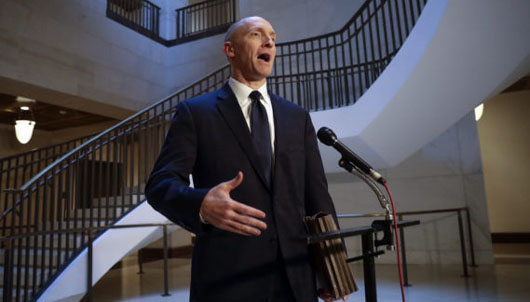by WorldTribune Staff, November 9, 2017
The “core foundation” of the FBI’s questioning of Trump associate Carter Page was based on the “dodgy dossier” funded by the Democratic Party and Hillary Clinton campaign, Page said in congressional testimony on Nov. 2.
Page testified before the House Intelligence Committee, which released a transcript of the testimony on Nov. 7.

Rep. Trey Gowdy, South Carolina Republican, asked Page how the FBI is conducting its investigation of alleged Russian collusion with the Trump campaign.
“So what were the questions the FBI had for you?” Gowdy asked.
Page responded: “It was an extensive series of many meetings, but they, you know, the core foundation, I would say, in terms of the overall structure in March 2017, was related to those false allegations from the ‘dodgy’ dossier.”
Page, who lived and worked in Moscow in the 2000s as a Merrill Lynch banker, is one of the main targets in the dossier authored by ex-British spy Christopher Steele.
Page is accused in the dossier of meeting with two sanctioned Kremlin figures while in Moscow in July 2016 to address the New Economic School. Steele said Carter promised to work to end U.S. sanctions against Russia in exchange for a brokerage commission. The dossier also said he and former Trump campaign Chairman Paul Manafort orchestrated the Russian interference to include hacking Democratic Party computers.
Page, who says all of the charges are fiction, said he never met the two Kremlin operatives and has never met Manafort.
“For months Republicans have tried to learn the extent to which then-FBI director James B. Comey relied on the dossier to open and conduct an investigation of the Trump campaign in the summer of 2016,” Rowan Scarborough wrote in a Nov. 7 report for The Washington Times. “For example, did Steele’s unverified charges underpin the FBI’s request for eavesdropping warrants?”
Comey refused to discuss the dossier in open testimony.
Last week, the FBI provided classified documents requested by House Permanent Select Committee on Intelligence Chairman Devin Nunes, California Republican. A spokesman said the information remains classified and is not releasable.
Asked at the Nov. 2 hearing how many times he sat down with the FBI, Page said, “Approximately four. They came up – you know, typically when the FBI has reached out to me previously, they give me a call. This time, in early March 2017, they just showed up. I was in the lobby near Lincoln Center in the Upper West Side of Manhattan, and they just walked up to me.”
When Gowdy asked if all the FBI questions pertained to the dossier, Page said, “Not all of [them], but I would say that that was a central foundation, and again, it would sort of branch out from there.”
Rep. Adam Schiff of California, the intel committee’s top Democrat, has quoted at length from the dossier, including the unproven charges against Page.
Schiff used the hearing to ask Page about every Russian he met during his July trip to Moscow. He also tried to link him to George Papadopoulos, a Trump campaign volunteer who lived in London at the time.
Papadopoulos pleaded guilty to lying to an FBI agent about when he actually started working for the campaign as he reached out to Russia-connected people.
“Just to be very clear, every meeting I ever had in Russia was completely benign,” Page said. “It was nothing, you know, nothing I would be ashamed of having broadcast on national television because, again, I’ve never done anything wrong, not only in those two years but throughout my life.”
“Congressman Schiff, I want to help this committee [however] I can,” Page said. “I just want to do that in a way that does not put me at jeopardy, both judicial – in the judicial system – as we’ve seen with Mr. Papadopoulos, but also with the extrajudicial punishment that I have been submitted to. After your interaction with Mr. Comey on March 20, 2017 I did receive significant personal domestic terrorist threats to myself.”
Subscribe to Geostrategy-Direct __________ Support Free Press Foundation
